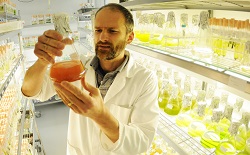 Scientists in Scotland have identified which algae are the best for biofuels. This article from the Scottish Association for Marine Science (SAMS) says the researchers used a new technique to figure out which ocean-based strains had the highest oil content.
Scientists in Scotland have identified which algae are the best for biofuels. This article from the Scottish Association for Marine Science (SAMS) says the researchers used a new technique to figure out which ocean-based strains had the highest oil content.
The screening revealed two marine strains, Nannochloropis oceanica and Chlorella vulgaris, which had a dry-weight oil content of more than 50 per cent. This makes them ideal sources of biofuel for vehicles and aircraft.
The results of the screening, part of the BioMara project, have been published in Nature’s online journal Scientific Reports and are likely to help bring forward research into algae as a source of biodiesel and other biofuels by a number of years.
SAMS scientists have demonstrated that Nannochloropsis, for example, is very efficient at converting nutrients, so it has the perfect combination of high levels of oil and high productivity.
The report’s lead author, Dr Stephen Slocombe, SAMS research associate in molecular biology, said: “In order to produce biofuels from micro-algae we will have to generate high yields, so we need to know which strains will produce the most oil.
“While there is a lot of work being done on micro-algae biotechnology – currently around 10,000 researchers across the world – no-one has identified a shortlist of the best performing strains and how their properties could be used.”
The research also identified algae varieties best for the health food industry.

